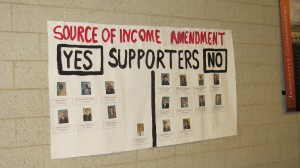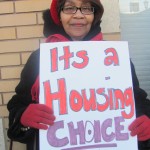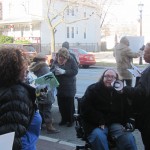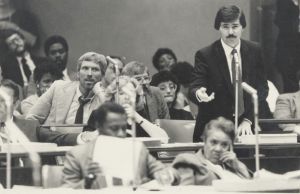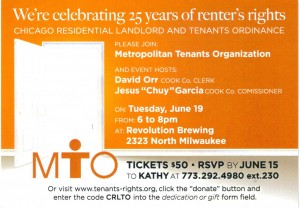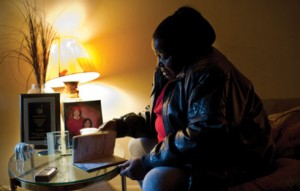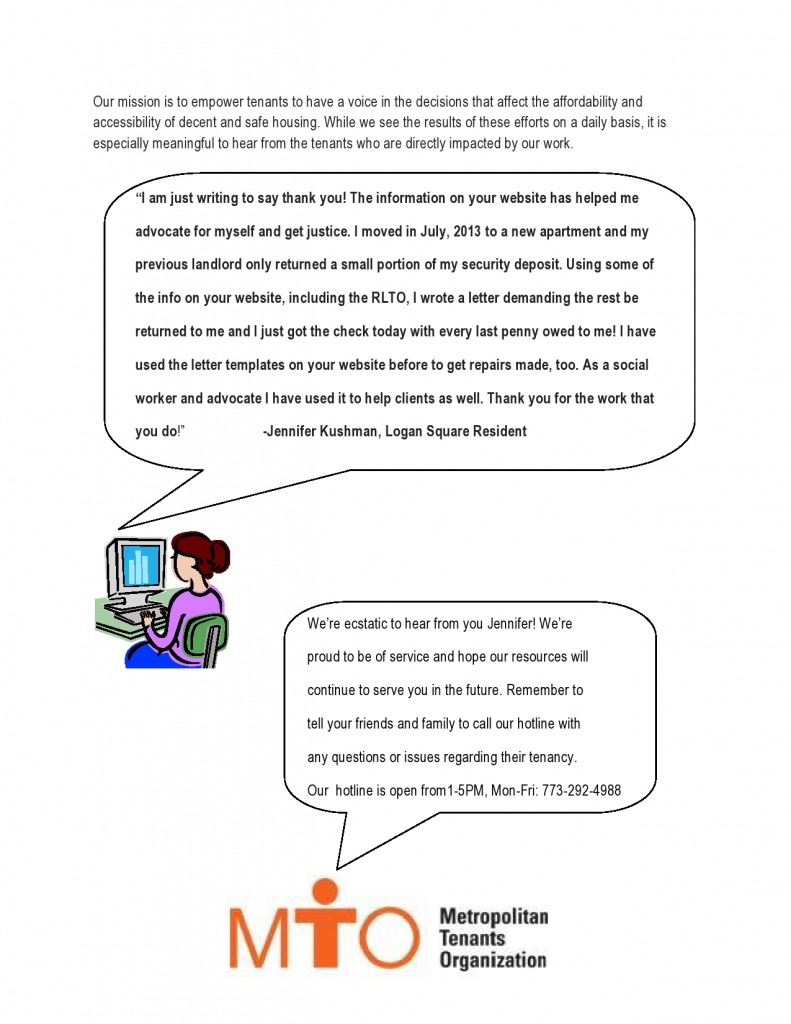
Category: More headlines
UPDATE: Keep Chicago Renting Ordinance Passed By City Council
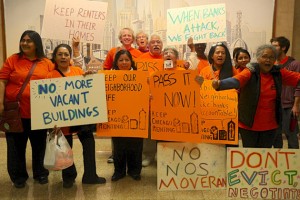 In the wake of the foreclosure crisis, community groups from the Keep Chicago Renting coalition, comprised of 13 labor, community and policy groups successfully worked for passage of the Keep Chicago Renting Ordinance (KCRO). At the City Council meeting on June 5th the city council overwhelmingly supported the ordinance with a vote of 45-4.
In the wake of the foreclosure crisis, community groups from the Keep Chicago Renting coalition, comprised of 13 labor, community and policy groups successfully worked for passage of the Keep Chicago Renting Ordinance (KCRO). At the City Council meeting on June 5th the city council overwhelmingly supported the ordinance with a vote of 45-4.
The KCRO is designed to increase protection for renters in Chicago. It requires banks to either allow renters in good standing and who pay their rent to stay in their homes; or requires that they pay tenants a relocation fee of $10,600 to leave the building.
The KCRO is designed to meet several goals facing renters and the communities where foreclosures take place. The first goal is to stabilize rental housing by keeping foreclosed renters in their homes. It is hoped that the fees will encourage banks and other entities taking over buildings in foreclosures to keep buildings open and available as rental housing. In the event that a bank chooses to empty a building, the new ordinance will allow eligible renters to receive funds that will enable an easier transition from their housing. The fee also standardizes the “cash for keys” process.
Another important goal was to decrease vacant properties which contribute to blight and crimes in communities. A report by the Lawyers Committee for Better Housing, showed a correlation between vacant buildings and increase in crime in communities.
The ordinance was published in July 2013 and will go into effect sometime in September 2013. If you are a renter affected by foreclosure, it is important to contact MTO’s Tenants Rights Hotline to be counseled on how the changes in foreclosure laws will impact your housing rights.
The MTO Hotline is open Monday through Friday from 1-5pm. The number to call is 773-292-4988.
Want to read the full text of the new ordinance? You can find it here: KCR Ordinance
Chicago Council passes Bed Bug Ordinance
The City of Chicago has recently been named the nation’s #1 city infested with bed bugs. Everyday MTO’s tenants’ rights hotline receives calls from renters throughout the City and suburbs dealing with the pesky pests. Bed bugs are not unique to Chicago. They are undoubtedly a nuisance and hard to control. Controlling bed bugs requires tenants and landlords working together.
On June 5, 2013, the City Council passed an ordinance aimed at putting an end to the spread of bed bugs. This ordinance will go into effect December 23, 2013. There are key components of the ordinance that all renters should know. Let’s start with landlord responsibilities:
- To supply a tenant starting or renewing a lease with an informational brochure
- To maintain a written record of bed bug control efforts
- To send a written notice to the tenant explaining their responsibilities before the inspection
- To provide pest control services when bed bugs are found by a pest management professional as many times as necessary to eliminate the problem
- To inspect within 10 days and treat if necessary the two units on either side as well as the two units above and below of the infested unit
The ordinance also outlines what tenants’ responsibilities are to help eliminate bed bugs. Please note that this section of the ordinance does not apply to tenants living in assisted living or a shared housing establishment, when the establishment provides assistance with daily living activities. According to the ordinance, tenant responsibilities include:
- To notify the landlord in writing of any suspected or known infestation in the tenants’ unit, clothing, furniture or personal property within 5 days
- To notify the landlord in writing of any recurring or unexplained bites, stings or sores suspected to be caused by bed bugs
- To cooperate with the landlord in the control, treatment, and eradication of bed bugs including
- To grant access at reasonable times upon reasonable notice for inspections and treatments/to not interfere
- To prepare unit prior to treatment including: cleaning, dusting, vacuuming
- To properly dispose of personal property that cannot be treated or cleaned before the pest control services
The Chicago Bed Bug Ordinance also mandates the disposal of bedding, clothing, furnishings or other infested materials. For example, you may not place, discard or dispose of any bedding, clothing or furnishings infested on the public way (i.e. dumpsters, sidewalks, hallways). To get rid of infested items, you must enclose the item in a plastic bag and label it as infested. Doing so should prevent neighbors from bringing to their home infested items, therefore stalling the spread of bed bugs.
The ordinance will be enforced by the Department of Buildings and the Department of Public Health. If any person is found violating the ordinance, that person may be fined $300.00 to $1,000 per day for each offense. By complying with the ordinance, these fees can be avoided. The full ordinance can be found at www.cityofchicago.org. You can make a request for a City inspector here.
For more information on tenants’ rights, please call MTO’s hotline at 773-292-4988/Monday-Friday 1-5 pm or visit www.tenants-rights.org/bed-bugs-faq. You can read the full ordinance here.
MTO Celebrates Past Success and Inspires for the Future
 Friends, activists and dignitaries packed the upstairs lounge at Revolution Brewing for Metropolitan Tenants Organization’s annual Renters’ Spring Celebration.
Friends, activists and dignitaries packed the upstairs lounge at Revolution Brewing for Metropolitan Tenants Organization’s annual Renters’ Spring Celebration.
This year’s celebration commemorated the 45th anniversary of the passage of the federal Fair Housing Act. Honorees for the evening included Cook County Commissioners Larry Suffredin, Robert Steele and Jesus Garcia as Fair Housing Champions. MTO recognized the Commissioners for their support of fair housing standards in the suburbs and for their work on the Source of Income legislation to end discrimination in Suburban Cook County. Beto Berrera of Access Living and Kate Walz of the Sargent Shriver National Center on Poverty Law received Tenant Champion Awards for their work with tenants facing discrimination and their advocacy to expand fair housing laws. The Ralph Scott Award, named in memory of longtime Chicago community activist and environmental health advocate Ralph Scott, was awarded to Rose Green of New Directions for Change in recognition of her leadership among renters throughout the city to fight for housing justice.
“It was a pleasure to honor Rose Green, Kate Walz, and Beto Barrera – three exemplary advocates for tenants in Chicago. It was also great to see so many old friends. I’m glad I came and will look forward to coming again next year!” Brian White, Charter One Bank.
View more photos from the event!
A Call to Action from MTO
End Discrimination Against Housing Choice Voucher Holders in Suburban Cook County
Dear Friends & Supporters:
This year, MTO, Access Living and Progress Center of Illinois and numerous supporters and endorsers are embarked on an effort to win passage of an amendment to the Cook County Human Rights Ordinance (CCHRO). The Source of Income protection – co-sponsored by Commissioners Jesus Garcia, Larry Suffredin and Robert Steele, would end discrimination against Housing Choice Voucher holders.
The CCHRO currently allows landlords to deny Housing Choice Voucher holders the right to apply for an apartment. Contrary to beliefs promoted by opponents of the amendment, a landlord would not be forced to rent to a voucher holder applicant. The landlord can still screen a tenant based on reasonable criteria such as past rental histories, credit checks, etc. Any successful landlord will tell you that the key to success is a good screening process based on facts. Click here to read more.
The amendment has 6 supporters on the Cook County Board of Commissioners:
7th District Commissioner Jesus Garcia, 13th District Commissioner Larry Suffredin, 2nd District Commissioner Robert Steele, 3rd District Commissioner Jerry Butler, 5th District Commissioner Deborah Sims, and 10th District Commissioner Bridget Gainer.
-Call to Action-
Please CALL and/or EMAIL the following Commissioners to express your support for the amendment.
Commissioner Earlean Collins (1st District): 312-603-4566 or 773-626-2184 – earlean.collins@cookcountyil.gov
Commissioner Edwin Reyes (8th District): 312-603-6386 or 773-588-1129 – edwin.reyes@cookcountyil.gov
Commissioner Joan Murphy (6th District): 312-603-4216 or 708-389-2125 – joan.murphy@cookcountyil.gov
Commissioner John Fritchey (12th District): 312-603-6380 or 773-871-4000 – commish@fritchey.com
Commissioner Peter Silvestri (9th District): 312-603-4393 or 773-774-8554 – cookcty9@aol.com
Commissioner Jeffrey Tobolski (16th District): 312-603-6384 or 708-352-2301 – jeffrey.tobolski@cookcountyil.gov
Let us know how it went and find out more about how you can get involved in this campaign. Contact Shirley at shirley@tenants-rights.org or 773-292-4980 ext 224.
Renters Protest Oak Park’s Largest Landlord
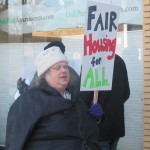 On Thursday, December 13, 2012, more than 40 tenants and advocates from across Cook County picketed Oak Park Apartments’ headquarters on Chicago Avenue to protest the company’s refusal to accept Housing Choice Vouchers. While it may be legal in Cook County suburbs to refuse to rent to Housing Choice Voucher holders, it is not morally right.
On Thursday, December 13, 2012, more than 40 tenants and advocates from across Cook County picketed Oak Park Apartments’ headquarters on Chicago Avenue to protest the company’s refusal to accept Housing Choice Vouchers. While it may be legal in Cook County suburbs to refuse to rent to Housing Choice Voucher holders, it is not morally right.
According to one Housing Choice Voucher holder that lives in Oak Park, who wanted to remain anonymous out of fear of retaliation, “I have been denied occupancy in countless properties including Oak Park Apartments, just because I have a voucher. This is just not fair. I pay my rent yet I cannot live in certain buildings!”
Adam Ballard of Access Living and a voucher holder stated, “Many people with disabilities rely on vouchers for their housing. We want Oak Park Apartments and Cook County to end this legalized discrimination. All we are asking is to be treated like anyone else.”
Currently, the City of Chicago forbids landlords to discriminate against voucher holders. There is no such prohibition in Cook County suburbs. Cook County Commissioner Jesus Garcia, is trying to change that and has introduced legislation that would amend the County’s Human Rights Ordinance to make it illegal to discriminate against Housing Choice Voucher holders.
After the picket, tenants went to Cook County Commissioner Earlene Collins’ office. The group wanted to know why Commissioner Collins had not signed on as a supporter of the amendment. While the Commissioner was away at the time, the group was promised a meeting with the Commissioner.
According to Shirley Johnson, Organizing Director of the Metropolitan Tenants Organization, “Section 8, Housing Choice Voucher Holders are stereotyped and therefore often forced to live in high crime, low opportunity communities. The recent presidential election proved that it is a “new America” where diversity rules. A rental policy that refuses to rent to voucher holders is blatant discrimination and should be outlawed, especially in today’s modern society.”
Oak Park Apartments claims to offer “the largest selection of well-maintained apartments perfect for those who want to experience Oak Park’s architectural character, its excellent school system and vibrant and diverse village feel.” However, they intentionally exclude Housing Choice Voucher holders from these opportunities.
Access Living, Progress Center and the Metropolitan Tenants Organization organized the protest. The groups promised to return. According to Adam Ballard of Access Living, “The fight for our rights has just begun.”
Help Yourself to a Healthy Home
The U.S. Department of Housing and Urban Development offers education on how to protect your children’s health with this booklet “Help Yourself to a Healthy Home.” Learn about what hidden dangers may be in your home and how get rid of them. Healthy Home topics include: indoor air quality, asthma & allergies, mold & moisture, carbon monoxide, lead, drinking water, hazardous household products, pesticides and home safety.
To learn more about Healthy Homes or to speak to an Organizer call us at 773-292-4980 ext 231
Help Yourself to a Healthy Home
Link: http://www.hud.gov/offices/lead/library/hhi/HYHH_Booklet.pdf
Get the Facts: Section 8 Protections Fact Sheets
Proposal to Amend the Cook County Human Rights Ordinance:
Preventing Source of Income Discrimination
The Problem:
• The Cook County Human Rights Ordinance (CCHRO) currently protects individuals from discrimination on the basis of a person’s source of income (i.e., child support, social security). The CCHRO however specifically exempts from protection persons with “Section 8” Housing Choice Vouchers. Presently housing providers can and do deny qualified households solely because they have a Housing Choice Voucher. Studies have shown that housing providers often refuse to rent to voucher holders as a pretext for other types of illegal discrimination such as race, familial status, and disability.
The Solution:
• The proposed ordinance amendment would include in the protection against source of income discrimination persons with Housing Choice Vouchers. The amendment would not force property owners to rent any or all of their units to any households using Housing Choice Vouchers. Property owners will still have the right to screen applicants.
• The City of Chicago and six other municipalities in Illinois, ten states, the District of Columbia, and ten counties around the country have laws that protect individuals from discrimination based upon the use of a Housing Choice Voucher.
• Voucher holders are some of the most scrutinized tenants and must meet the rigorous admission criteria of the voucher administrator as well as comply with lease provisions. Nearly 40% of voucher recipients are employed and more than 30% are seniors or persons with disabilities. There is absolutely no evidence that persons who use Housing Choice Vouchers to make their housing affordable perpetuate or increase crime in communities.
• Landlord participation in the voucher program is not unduly burdensome. Landlords only have to complete three simple forms. Payments made by the housing authority are made electronically. Units must pass a Housing Quality Standards inspection. Voucher recipients have to complete most of the paperwork.
• By supporting this amendment to the CCHRO, the last remaining type of source of income discrimination in Cook County can finally end.
HACC Reply to Lincoln Property Company
Supporters of Source Income Protection for Section 8 Voucher Holders:
Access Living
Bethel New Life
Bickerdike Redevelopment Corporation
Chicago Anti Eviction League
Chicago Area Fair Housing Alliance
Chicago Coalition for the Homeless
Chicago Housing Authority
Chicago Lawyers’ Committee for Civil Rights Under Law
Chicago Urban League
Claretian Associates
Citizen Action Illinois
Connections for the Homeless
Evanston NAACP
Ford Heights Community Service Organization
Healthcare Alternative Systems (HAS)
Heartland Alliance for Human Needs & Human Rights
HOPE Fair Housing Center
Housing Action Illinois
Housing Authority of the County of Cook
Housing Choice Partners
Housing Opportunity Development Corporation
Interfaith Housing Center of the Northern Suburbs
Independent Voters of Illinois/ Independent Precinct Organization
Jane Addams Senior Caucus
Jewish Council on Urban Affairs
Jobs with Justice
John Marshall Law School Fair Housing Legal Clinic
Kingdom Community
La Casa Norte
Lakeside Community Development Corporation
Latin United Community Housing Association (LUCHA)
Latino Policy Forum
Lawyers’ Committee for Better Housing
League of Women Voters of Cook County
Logan Square Neighborhood Association
Metropolitan Family Services
Metropolitan Tenants Organization
National Fair Housing Alliance
New Directions for Change
Northwest Side Housing Center
Progress Center for Independent Living
Protestants for the Common Good
Respond Now
The Sargent Shriver National Center on Poverty Law
SEIU Local 73
South Suburban Housing Center
South Suburban PADS
Spanish Coalition for Housing
Supportive Housing Providers Association
Target Area Development Corporation
United Congress of Community and Religious Organizations
West Suburban PADS
Woodstock Institute
Celebrating the Tenants’ Bill of Rights…
More than twenty five years ago, few laws protected renters from disrepair, illegal eviction and retaliation. That all changed thanks to a dedicated group of tenants who campaigned for five years and had passed the Residential Landlord and Tenant Ordinance (RLTO). Mayor Harold Washington enacted the RLTO in 1986. Also known as the “Tenants’ Bill of Rights” it set forth the rights and responsibilities of both landlords and tenants, which led to the founding of the Metropolitan Tenants Organization. Everyday the RLTO protects renters’ basic human right to safe, decent and affordable housing throughout the City of Chicago.
In its honor, the Metropolitan Tenants Organization is celebrating 25 years of renters’ rights on June 19, 2012 at Revolution Brewing – 2323 N. Milwaukee from 6-8 p.m. Join MTO and over 100 leaders from across the city for a night of food, drinks, live music and fun!!! Special event hosts include Cook County Clerk David Orr and Cook County Commissioner Jesus “Chuy” Garcia.
Tickets are just $50. You also have the option to showcase your organization with an ad space in the sponsorship booklet to tell others about your great work. Please contact Kathy at 773-292-4980 ext 230 by June 15 to RSVP or visit us here to make your donation and enter “CRLTO” in the dedication or gift form field.
See you on the June 19th!
“Subsidized Money Pit” – Chicago Reporter investigates
Mary Smith was living on a quiet Woodlawn block in 1978 when she got the news that she landed an apartment in one of the neighborhood’s first federally subsidized buildings. At the time, the golden-brick courtyard building at 6134 S. Kimbark Ave. was a bright spot in the neighborhood, which was struggling to regain its footing a decade after a spate of rioting that followed Martin Luther King Jr.’s assassination in 1968. Smith was just shy of 30 but already knew something about rebuilding herself. After moving from Tennessee, she was adjusting to life as a single mother and a widow in Chicago.
Smith has a round face spotted with freckles and speaks with a lisp. Her voice rises when she talks about her family’s early days on Kimbark. “We were 100 units strong,” she said of her neighbors, some of whom still live on the block. “We were taking care of the place. We were gardening. We were thriving.”
But more than three decades later, the building on the corner of 62nd Street and Kimbark Avenue has become more a symbol of failure than hope.
The heat is chronically cut off in the building. In most units, radiator covers hang half-cocked from the walls so tenants have pulled couches and beds in front of the hot pipes to avoid getting scorched. Some have taken in cats to catch the mice. One elderly woman keeps a cooler in her den to catch the rainwater that pours through gaps in the ceiling that the building’s maintenance crew tried to patch up with a piece of plywood and duct tape.
After barely passing federal inspection standards in recent years, the Kimbark building, along with a handful of other neighboring, federally subsidized buildings owned by the same company, earned a failing score of 43 out of 100 points last year. That was 17 points shy of just scraping by. One more failed inspection, and the government could step in to foreclose on the property. It is also plausible that the property could be sold off and the subsidies lost.
For tenants and housing activists, the problems at Kimbark go deeper than brick and mortar. The decaying building is a symbol of how public officials have looked the other way as landlords throughout Chicago received more than a billion in federal housing subsidies during the past decade while running some of their properties into the ground and, in some cases, using the buildings as their own personal ATMs.
A Chicago Reporter review of federal and local housing records found that 27 out of 194 properties containing more than 24,000 nonsenior federally subsidized housing units in Chicago failed at least one inspection between 2008 and 2010. Of 93 landlords overseeing these properties, 22 have been hauled into housing court by city attorneys who are suing them for at least $304,000 worth of violations since 2005. Two landlords, in particular, were taken to housing court on 22 separate occasions and amassed one-third, or $102,000, of the fines levied against property owners during that period.
Few people have worked with as many troubled Section 8 buildings as Shirley Johnson, the organizing director of the Chicago-based Metropolitan Tenants Organization. In her eyes, federal and local housing officials are doing too little to hit landlords where it hurts: the pocketbook. “They slap ’em on the hand, and they’re right back in the game,” Johnson said.
Johnson added that tenants should have a seat at the negotiating table. “Safe and decent housing—that’s all the tenants want,” she said. “They don’t care who is the owner or the manager. They just want them to be accountable.”
But officials said that, with affordable housing in increasingly short supply, a hard-nosed approach isn’t always the best way to fix troubled buildings. “We really do look at preservation as our main focus,” said Ed Hinsberger, director of the Chicago multifamily hub at the U.S. Department of Housing and Urban Development, who oversees subsidized multifamily buildings in Chicago.
Preserving the subsidies, Hinsberger said, means striking a delicate balance between holding building owners and managers accountable in the short term without leaning so hard that they decide to opt out of the program and sell the properties on the private market. “We try and figure out how to save a project, but it’s hard,” he said. “We don’t own it. We don’t control it. We can’t decide who it will go to. That’s beyond our authority.”
Still, critics said, the status quo that is tolerating too many substandard housing units must not be an option for HUD. That’s especially true, they said, considering that, with the widespread demolition of traditional public housing, the subsidized apartments represent the last bastion of stable housing for low-income families. More nonsenior apartments now exist in the 194 subsidized properties than those operated by the Chicago Housing Authority.
Jim Grow, an attorney with the National Housing Law Project, said poor performing owners and managers will have little incentive to improve until HUD takes a “more nuisanced approach” to dealing with troubled buildings. “You have to have a monitoring system that’s up for the task,” Grow said. “It’s a failure of the regulatory system to provide the money and not the quality.”
* * *
When Congress struck a deal in the early 1970s to begin pouring billions of dollars each year into subsidized housing, a group of young Chicago developers with an eye on rebuilding troubled neighborhoods began snapping up investments. Under the Section 8 agreements, they were guaranteed market-rate rents for up to 30 years. In exchange, they had to provide decent, safe housing for cash-strapped households.
The units are rented out on a first-come, first-served basis. To remain compliant, the landlords are required to submit annual financial reports and pass federal inspections, assessed on the safety and cleanliness of each property.
Experts point out that inspection scores are weighted, and common areas—like lobbies and grounds—can artificially boost scores or unfairly drag them down. Despite the limits, the inspections are one of the few benchmarks for measuring success. Until this fall, if landlords scored below 60 two years in a row, HUD had the power to push them into foreclosure. Under the new guideline, scoring between 30 and 59 puts the owners under increased scrutiny.
The Reporter analysis of federal data found that 30 of the 199 inspections recorded between 2008 and 2010 found failing conditions in Chicago, and 43 led to a score that was within five points of failing. This marked a nearly threefold increase in failing scores compared with the three prior years, when slightly more inspections were logged. While those scores should have raised red flags, HUD’s response has been lax. In 2009, for example, only two of the nine properties due for reinspection because of initial failing scores were scored that year.
HUD’s Hinsberger said he isn’t convinced that the failed inspections are the most accurate way of determining trends or even the overall health of Chicago’s portfolio. Some years, there are few inspections, he said, because budgets are tight. “Those inspections cost money,” he said. “Sometimes we don’t have the funds.”
Still, Grow said, officials could do more to bring troubled properties in line. HUD officials rarely put a financial squeeze on owners by gradually reducing subsidies to low-performing buildings, he said. And the agency should have a better policy for reviewing which owners are borrowing against their buildings. “Why should somebody be able to refinance and take out money without at least 70 [on their scores]?” Grow said.
Indeed, five out of 15 Chicago properties that have failed at least one federal inspection since 2008 were remortgaged within six years prior to failed inspection, a Reporter review of real estate records found.
“The system is set up so that the property is seen as a commodity, and the living conditions for residents are seen as secondary,” said Matt Ginsberg-Jaeckle, a community organizer with Southside Together Organizing for Power, a nonprofit that has been working with tenants for years to improve conditions in a series of Section 8 buildings on the city’s South Side.
With many of the contracts coming to an end, the properties have become much more susceptible to forces in the private real estate market. Roughly a decade ago, Kevin Jackson, executive director at the Chicago Rehab Network, began sounding the alarm that Chicago was facing an “invisible crisis” as the subsidies tied to roughly 21,000 units were scheduled to expire between 2000 and 2005. When the real estate market took a nose dive, Jackson said, landlords began rethinking the value of the guaranteed subsidies and have shown “a heightened interest” in extending their contracts.
As far as Johnson of the Metropolitan Tenants Organization is concerned, if landlords want the guarantees that come along with extensions—including up to nearly $290 million in rents for 2011 alone—federal officials should be pushing harder for building improvements. “HUD has a lot of leverage,” she said. “That’s where these landlords are getting their rent.”
City attorneys, meanwhile, have stepped up enforcement on troubled Section 8 buildings in recent years, citing the owners for violations by hauling some of them into housing court.
The bottom line, said former Chicago Department of Housing Commissioner Jack Markowski, who is now president of the Community Investment Corporation, which controls a fund that helps stabilize troubled buildings including Section 8 properties, is that “the city often has used code enforcement as a way to go after bad management.”
At least 31 properties have been sued by the city in housing court since 2005. A vast majority, or 75 percent, of the cases were filed between 2008 and 2011. Some of the cases involve fairly minor violations, such as doing construction without a permit and painting over electrical switches. Others are more serious. They include structurally unsound porches, missing smoke detectors and no heat or hot water in winter.
More than one-third of the housing court cases involve just two companies—East Lake Management and Development Corporation and the Woodlawn Redevelopment Corp. No. 2—which have racked up a combined $102,000 in fines. The number of fines attributed to East Lake, which is run by Elzie Higginbottom, is in part because the company oversees more Section 8 units—3,094 apartments in all—than any other entity. The company also manages a wide portfolio, which, like the Woodlawn Redevelopment Corp. No. 2’s parent company, includes Chicago Housing Authority properties.
Eileen Rhodes, vice president at East Lake, pointed out that the management company’s buildings have been given few failing scores on federal inspections—three in 78 inspections—in the past decade. “I think that the [federal inspections] are an indicator that the properties are in good shape,” she said.
Ironically, some of those troubled buildings surpassed expectations when it came to federal inspections. The Woodlawn Redevelopment Corp. No. 2, for example, was given a passing grade in 2009 at the same time it was being sued by the city for building code violations that included rodent infestation, mold and standing sewage.
* * *
The three-story building at 6134 S. Kimbark Ave. doesn’t look like much from the curb. Its golden-brick facade is dulled by the fine lines of age. A black wrought-iron fence rings a lawn that’s spotted with ashy patches of dirt.
The initial federal investment in the property—HUD had agreed to lock into 30 years of rent subsidies in 1974—was a sign that redevelopment was possible in the struggling Woodlawn community. For a young community organizer, Leon Finney Jr., the federal money was like a down payment on a local development initiative he called “The Dream Plan.”
Finney grew up in the neighborhood and was a rising star in the scrappy nonprofit, The Woodlawn Organization. With the community organizing skills imparted on him by the famed Saul Alinsky, his goal was to channel his neighbors’ desires—for decent housing and jobs—into action. That was The Dream Plan. And housing was key.
More than 30 years after the Section 8 program began, no section of the city was eligible for more rent subsidies last year than 60637, the ZIP code that includes Woodlawn and neighboring Washington Park. More than one in every $10 committed to Section 8 rents went to the 3,126 apartments in the area roughly bounded by State Street, Lake Shore Drive, and 51st and 73rd streets.
No Section 8 property has faced more recent scrutiny for how it has been managed than the Kimbark buildings, which are owned by the Woodlawn Redevelopment Corp. No. 2, an entity set up by Finney, and managed by the Woodlawn Community Development Corp., which oversees 902 Section 8 units throughout the city.
In late November, the city filed two fresh lawsuits against the nonprofit because the heat wasn’t working consistently for three weeks. Since 2008, the city has initiated eight additional legal cases concerning the cluster of buildings, which is anchored by the Kimbark building. All told, the city has sued the Woodlawn Redevelopment Corp. No. 2 for $57,755 in fines related to the Kimbark portfolio since 2008. The nonprofit faces another $140,685 in housing court fines for a string of unrelated, but troubled, rental buildings that are in foreclosure.
In December, city officials signaled that they were fed up with the ongoing disrepair at Kimbark. The Woodlawn Redevelopment Corp. No. 2 was added to a list of “building code scofflaws” who have failed to address scores of code violations in the past year. Finney has pledged to get his organization’s name removed from the list to avoid losing city contracts.
“In most other jurisdictions, HUD would have said, ‘You’re done,’” said Kate Walz, housing justice director at the Sargent Shriver National Center on Poverty Law. Walz has represented the Kimbark Tenants Association, which is co-chaired by Smith, in court in the past couple of years. “Chicago’s HUD office is looking at preservation. Otherwise, only tenants will suffer.”
A Reporter review of the management company’s financial records found that the building’s poor conditions have only been exacerbated by the nonprofit’s financial practices. In 2006, the property was refinanced, but few needed repairs were made with the money. Then, in 2009, more than $163,000 was transferred out of the property to cover unrelated expenses including payroll and bank overdrafts, the records show. The next year, federal inspectors found the buildings in such disrepair that they were given a failing score.
Finney rejected that the conditions at Kimbark are a reflection on his nonprofit’s property management skills. “Are you going to define me by that one property?” he said. “I have been there and done whatever needed to be done to make life well and function for not only them but for literally thousands of other people. So I just reject the idea of that.”
HUD has “some financial concerns” about how Kimbark and some other Section 8 properties are being managed by the Woodlawn Community Development Corp., according to Hinsberger. The agency has chided Finney in recent years for dipping into restricted housing subsidies to cover payroll and other expenses—some of which are tied to its sister agency, The Woodlawn Organization, independent audit reports show.
But it’s translated into little change for tenants who have learned to live with the substandard conditions.
For the second time in four years, Finney is attempting to sell the property, and he’s close to sealing the deal. If this deal goes through, the federal subsidy will be extended until 2029. Cullen Davis, whose company, Urban Property Investments, manages a series of other Section 8 properties, along with a partner, is expected to take the property over in January. The Illinois Housing Development Authority has approved $10 million in tax credits to begin rehabbing the Kimbark building. That’s money that the Woodlawn Redevelopment Corp. was not eligible for because of its poor property management track record.
The hope is that the new owners will do a better job at managing the federal subsidies, which should pump up to nearly $1.3 million in rents into the 100-unit development next year. Poor conditions have led to vacancies, though. About one-third of the 100 units sit empty.
The way Smith sees it, she’s faced with two bad choices: Stay at Kimbark and hope conditions improve under the new ownership or live with the chaos.
“I don’t want to leave this community,” said Smith, now 62 and retired. “I want to have a place where my kids can come back to and say, ‘I grew up here,’ so they feel like they have some roots.”
Emily Gowing and Sachiko Yoshitsugu helped research this article.
Photo: Mary Smith flips through her datebook, recalling a three-week period in the fall when the heat in her Woodlawn apartment building wasn’t working because of a broken boiler. Photo by Marc Monaghan.


